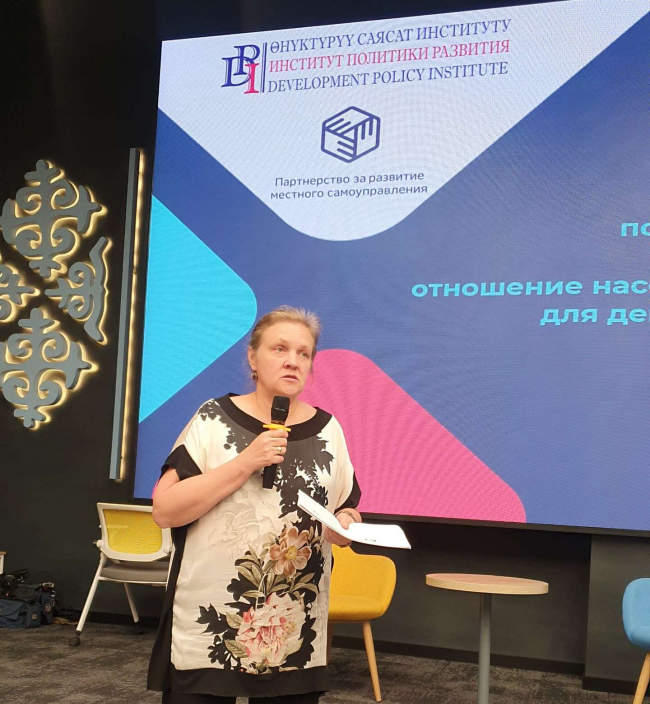Gender quota in local councils: people support it, but there are certain areas where an information campaign is needed

On September 20, 2024, the “Yntymak Week-2024”1 ended. On the final day of this Week, the Chairperson of the DPI Board Nadezhda Dobretsova presented the results of a survey on the topic “Expanding women’s political rights at the local level: the population’s attitude to the gender quota for local council deputies”.
“In the summer of 2024, commissioned by the Central Commission for Holding Elections and Referendums in the Kyrgyz Republic, the Development Policy Institute, on behalf of the Partnership "For the Development of Local Self-Government in the Kyrgyz Republic", conducted a sociological survey. One of the objectives of the survey was to assess public attitudes towards issues of women's political empowerment in the context of their participation in the upcoming local elections, tentatively scheduled for autumn 2024. The total number of respondents was 2,637 people, including 1,660 women and 977 men. In total, the survey covered 39 districts of the Kyrgyz Republic (one district, Chon-Alai, was excluded from the survey for technical reasons),” – said Nadezhda Dobretsova.
According to the survey results, in general, the opinions of citizens of the Kyrgyz Republic regarding the 30% gender quota in elections to local councils are divided, although the majority (79%) support the quota in one form or another. Slightly more than half (56%) support a 30 (18.5%) and 50% quota (38%). Almost a quarter (23%) believe that a quota is needed, but in an amount less than 30%. Every tenth person expressed an opinion “against the quota,” saying that everything depends on the person. At the same time, there are significant – tenfold differences in the attitude of citizens who believe that the quota should be less than 30% in the breakdown by districts. Thus, in two districts of the Issyk-Kul and Chui provinces, the share of such citizens is only 4-5%, and in five other districts of the republic, the share of such responses can reach 40% or more (maximum – 46%).
A comparison of attitudes toward the quota with the assessment of the work of female deputies showed that a negative attitude toward the quota has little to do with the business and political qualities of women as deputies. When respondents were asked to assess the quality of work of female deputies in comparison with the work of male deputies, the majority – 62.1% – of citizens said that female deputies cope with their duties perfectly. The opinions of women and men regarding the quality of work of female deputies differ, but only slightly (64.2 and 58.6%, respectively, rated the work of female deputies as “excellent”).
“We also noticed that the conditions under which a woman makes a decision to participate in local elections begin in the family and largely depend on what family members are guided by when building relationships, what family model they support, what sets of rules and values dominate this institution. For example, the older people are, the more they tend to be guided in building family relationships by the foundations and traditions inherited from their ancestors. Thus, in most Kyrgyz families, built on the foundations and traditions inherited from their ancestors, the political career of women is not rejected (historically, women could play a significant role in the politics of the Kyrgyz state), but it is not encouraged either. During the 2021 election campaign, empirical observations were made that it is more difficult for women with the status of "kelin" (daughter-in-law, "outsider") to exercise their political leadership than a woman who is of local origin. In general, the hypothesis was confirmed, as almost 40% of respondents are ready to primarily support their native countrywoman and give preference to her, rather than a woman with the status of "kelin". However, unlike other questions, no significant differences were found between the answers of different age groups,” – the Chairperson of the DPI Board concluded her speech.
The survey results caused an active discussion among those present, who shared examples from their personal experiences.
Avazkan Ormonova, a local council member of the Zhoosh aiyl aimak, noted that "there are many structural barriers in society regarding the implementation of women's political rights". "We often hear various excuses, such as no money, insufficient experience, etc. In fact, this is not the main thing. The stereotype factor comes first".
Another participant agreed with the survey results and expressed her opinion that it is necessary to conduct a revision of various values, traditions, practices, adats, and take those that can be modernized. "I agree that it is necessary to use the potential for protection and creation of conditions for the female part of the population. But it is necessary to determine the executor and the criteria by which all this will be implemented".
The full results of the survey can be found in the September and October issues of the “Municipality” magazine www.municipalitet.kg
____________
1 Further details on “Yntymak Week” concept: : https://yntymakweek.org/concept_en

